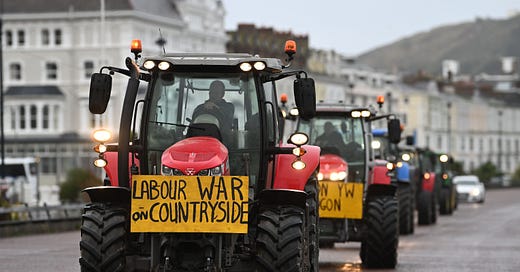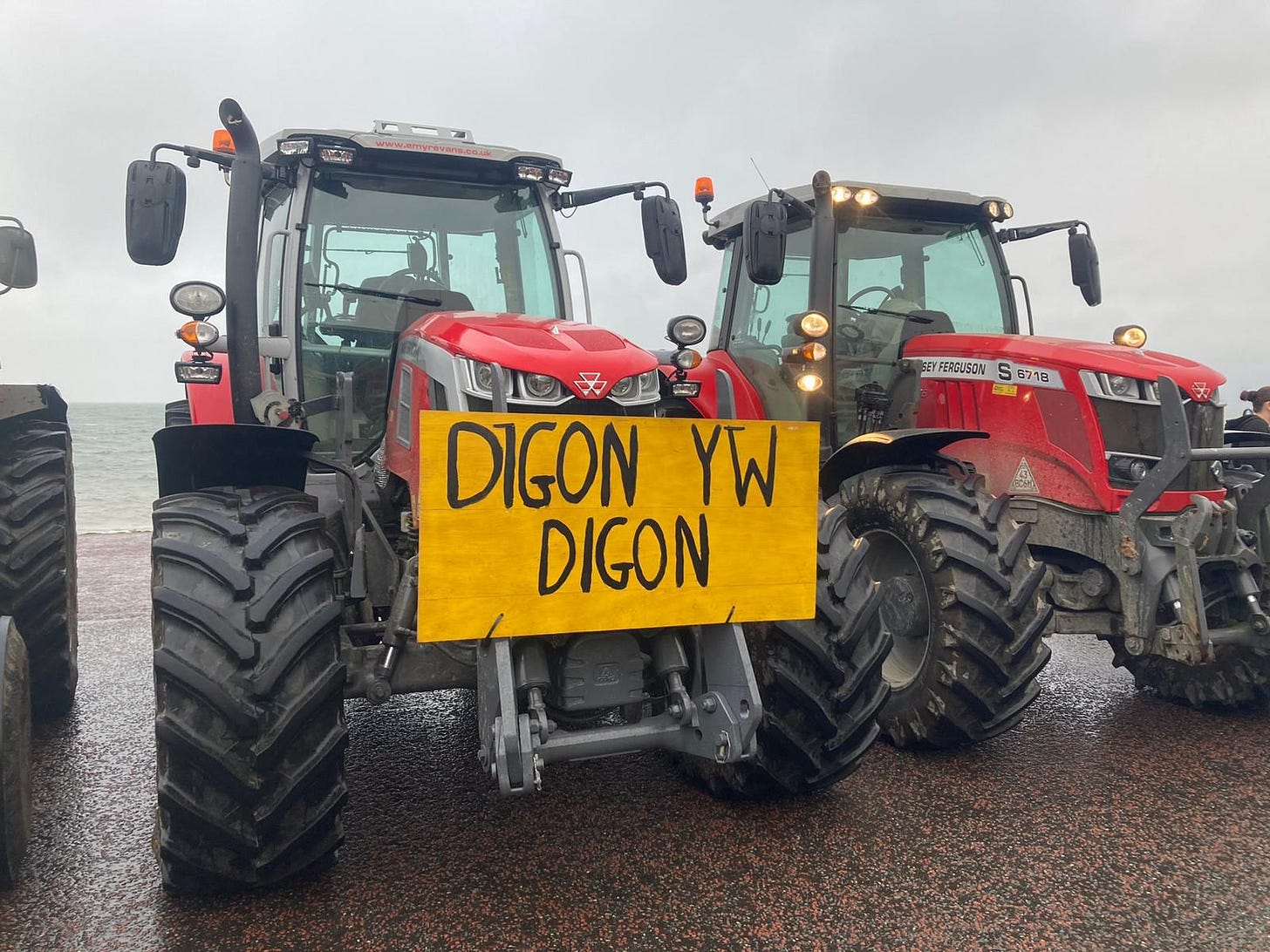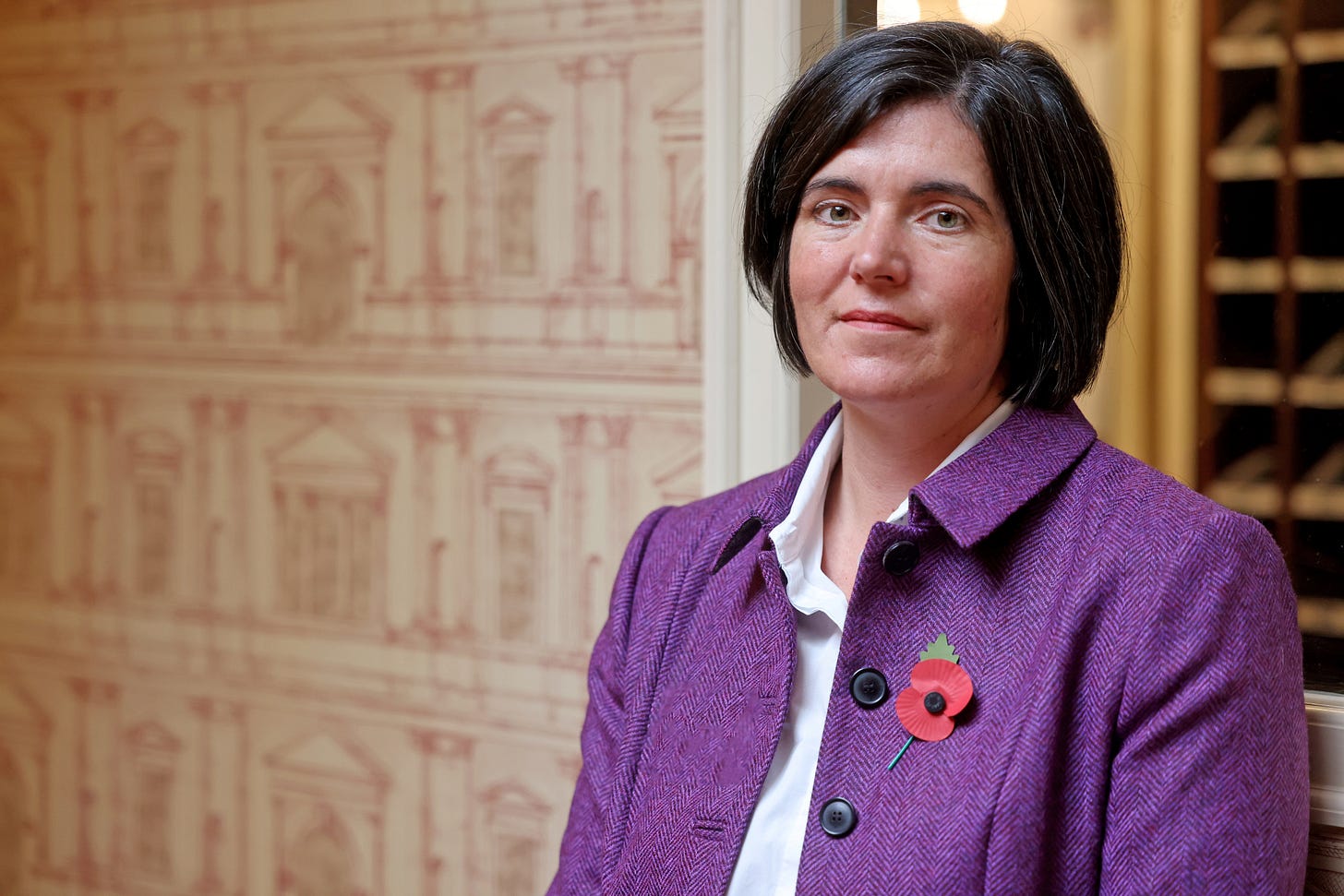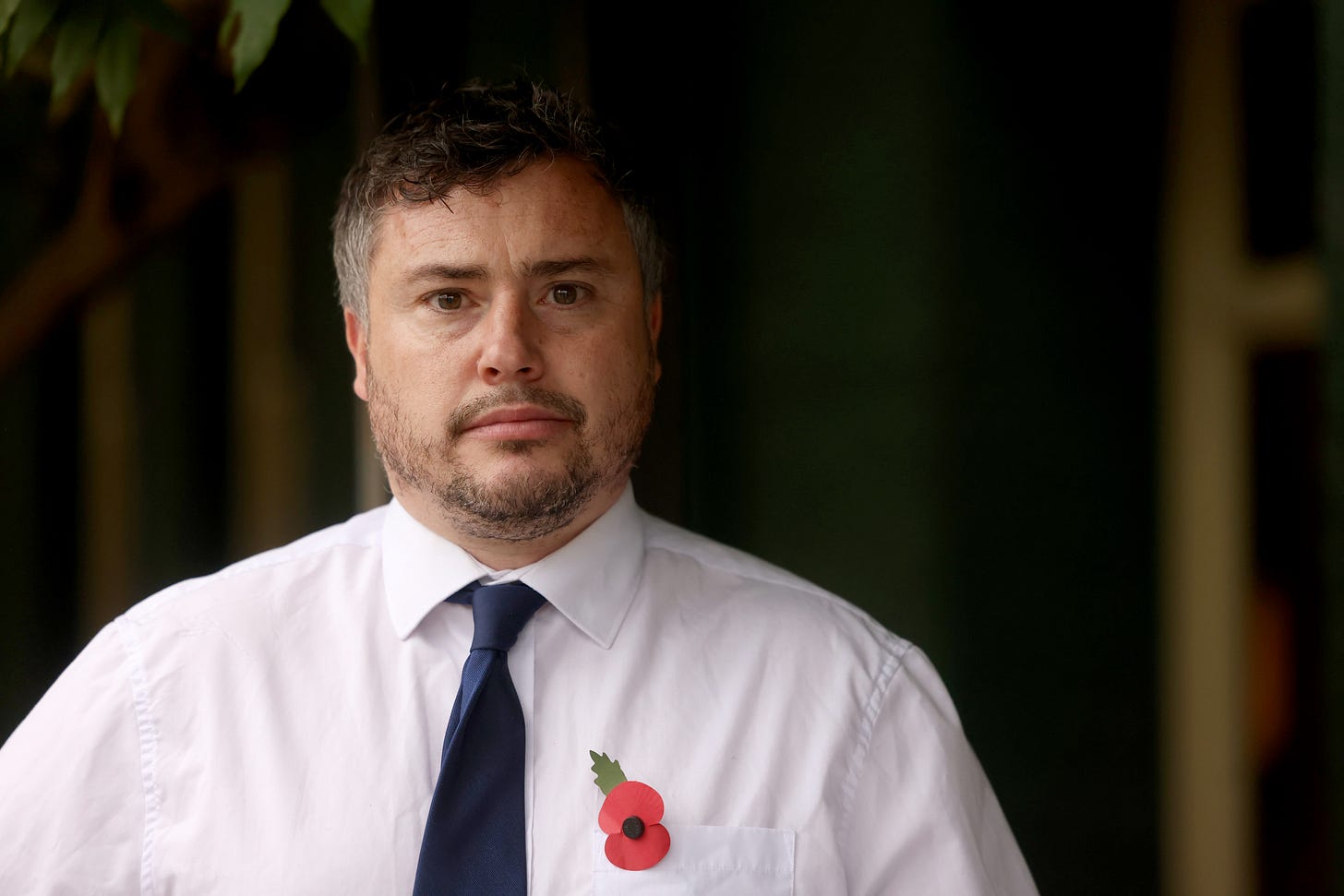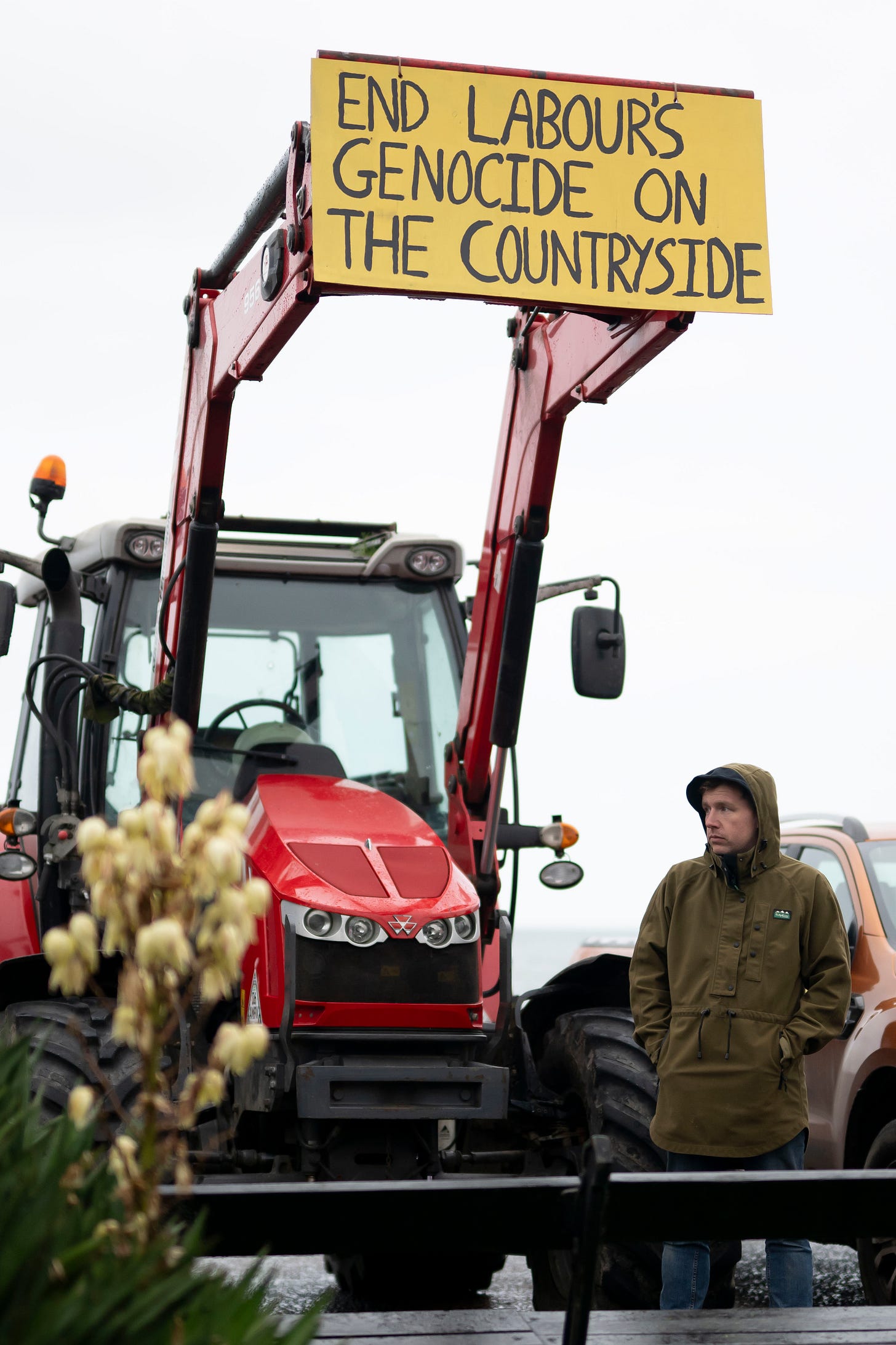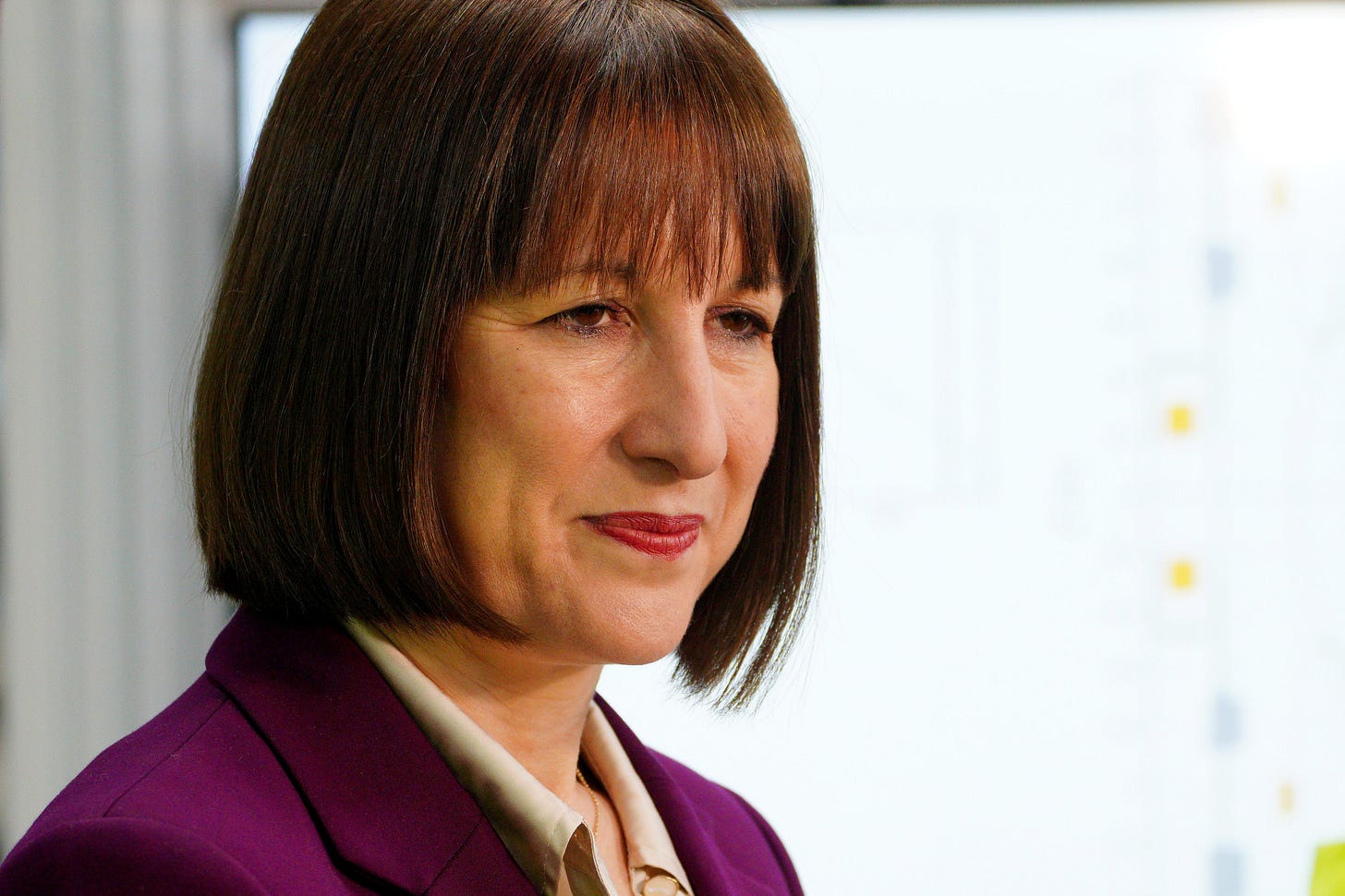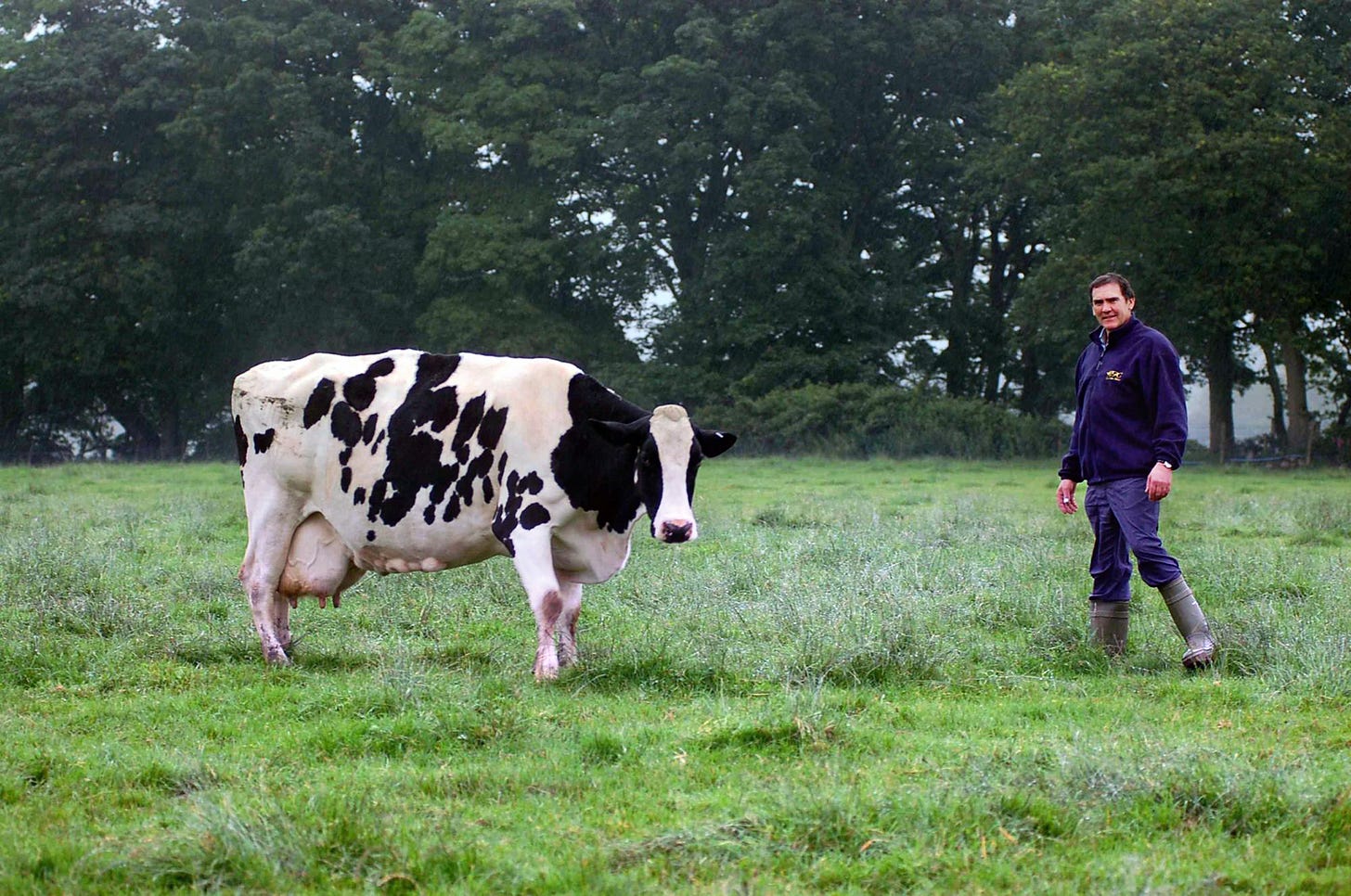Digon yw Digon. Enough is enough.
A huge part of Welsh society believed they are ruled by a government that doesn't understand their industry and is putting the future of their families and their way of life at risk
The sight of a line of tractors rolling down the promenade on Llandudno seafront has not lost its impact. Farmers won headlines around the UK on Saturday with their protest about changes to inheritance tax while Prime Minister Keir Starmer attended to the Welsh Labour conference.
Political Editor Ruth Mosalski has spent time with farmers from around Wales to understand why they see this as an existential issue and believe the new government has not taken the trouble to understand the impact it will have on the very fabric of Welsh agricultural life. This is her despatch.
It's eight days since Rachel Reeves announced her Budget when the National Farmers' Union Cymru's annual conference takes place. The anger, frustration and upset is almost palpable in the conference room of the Metropole Hotel in Llandrindod Wells as they struggle to understand the thought behind a policy announcement which makes changes to the rules governing inheritance taxes relating to farms.
During a speech by the deputy First Minister Huw Irranca-Davies, one member shouted to him: "This will be the death of family farms in Wales". All those I spoke to during the day agreed with that statement, with several saying they believe the UK Government has got the numbers behind its policy wrong.
"I haven't slept since it was announced. It's difficult to explain but the land and where I'm from is part of who I am. I am sad, I'm upset, I'm angry. It breaks my heart"
As well as anger, there was a sense of bewilderment about how the newly-in-post Labour government had decided to target farmers because in February 2023, Keir Starmer, then Labour leader, told NFU conference: "Losing a farm is not like losing any other business, it can’t come back"
In the Budget on October 30, Ms Reeves announced that farmers would no longer get 100% relief on inheritance tax, and from April 2026 will have to pay 20% tax on farms worth over £1 million. The Treasury says that there are other exemptions that can be used, making the threshold, in practice, £3m meaning it would only target the wealthiest landowners.
Agricultural property relief (APR) was introduced in 1984, and allowed land used for crops or rearing animals, as well as farm buildings, cottages and houses to be exempt from inheritance tax. Its aim was to reduce the amount of inheritance tax farmers and landowners would pay when they pass on their farmland.
The UK Government's Treasury says 28% of farmers will be affected by the new inheritance tax rules, but unions say figures from Defra, the government department, show far more will be affected. The Treasury has said 73% of APR claims are are below £1m and so would be unaffected by this policy, but Defra figures show only 34% of farms are under £1m net worth.
There is no doubt from those gathered in Llandrindod that - based on the limited detail available - the change would be catastrophic for Wales. As the Budget was announced, Kath Whitrow (pictured below) was at a livestock market listening in on a phone. There was, she said, immediate panic by those as they heard: "It was just 'oh my God'. There was a little bit of panic, and you look at social media and people were saying all sorts."
"The concern is 'how does this impact us' but it's serious and scary".
She recalled the words the now Prime Minister spoke the previous year, but says the new announcement in "one fell swoop has potentially delivered the axe."
She's an upland beef and sheep farmer in the Brecon Beacons, but the warnings come no matter where someone farms, or what they farm. Borth dairy farmer Martin Griffiths, Aled Davies, who has a beef and sheep farm in the Aeron Valley, even Abi Reader, the deputy president who farms in the Vale of Glamorgan, or Aled Jones, president who runs a pedigree herd of Holstein cows in Caernarfon all echo similar words and are worried about the long-term sustainability of many Welsh farms.
This isn't just about the financial impact on one person. They are all farmers who are proud of their farms, their role in Welsh life, and continuing their family legacies. Based on the detail available to them, many say this rule change alone will make their farms unviable, ending the many decades of links families have with the land and potentially driving up food prices and stagnating an industry which is both a Welsh economic success story and at a vital part of the battle against climate change.
Abi Reader (pictured below) is a third generation mixed farmer, farming in Wenvoe, just outside Cardiff. "Wales is going to be hit harder," she said, just after meeting the deputy First Minister Huw Irranca-Davies and presenting him with examples of how farms in the constituency he represents would be impacted. "It will be the death of family farms," she says.
"Your typical farm where Huw's from, where I'm from, is probably going to be about 300 acres, with a mix of ground, probably some arable, some some livestock, a mix of ground, some good, some mediocre so a typical farm is going to be worth about £3.5 million in his patch. We've then got an opportunity if you've a conservative family who have a father and a mother, and then kids, one dies, say the dad, he will pass £1m down and the rest along to his wife. When she dies and passes another million, and then the rest is subject to inheritance tax. So in a £3.5m farm, those kids are going to looking at an inheritance tax liability for half a million. They've got the opportunity to, we're reassured by the UK Government, that it doesn't matter because we could pay back that half million over ten years. I can assure you if I had [to repay] £500,000 over the next 10 years I wouldn't be as I am now.
"On top of that, if we want to take that 10 years they will charge 9% interest on that half a million. "So you say to yourself, I've got to find half a million in cash. Half a million cash doesn't exist on farms. I know we're rich people in terms of assets, but it's all in the soil. If people say they will have sell a proportion of their farm, suddenly, they become unviable. Your typical 300-acre farm, a dairy farm like mine, you have 200 cows and you suddenly have to sell 50 acres to pay that, you are then going to have to get rid of 50 cows and a member of staff, your finance and loans and all sorts of other payback will mean you are not viable."
On her family farm, both her parents are alive, but her father has severe heart disease and dementia. If the land is left to someone else to farm, then it must be held for seven years prior to the transfer or date of death to be eligible for APR. "He does not have seven years to gift me the farm, so immediately my £1m has disappeared, and I've got an opportunity to receive a million in tax relief from Mum, but this farm is worth £3.5 million. So mine is going to be higher than that. It's going to be enormous," she says.
They haven't done their due diligence with this, it's going to end up that once the owner dies, the children will have to pay the tax, and to do that, they will have to sell land and the farm will be unviable
Aled Davies (pictured below) returned from university to his family farm in the Aeron Valley in 2003, when his dad died. He's a sixth generation farmer on the land which has been owned by his family for 100 years, and tenanted by them for 25 years before that. He calls himself a "custodian" of the land, land which he hopes - if they want to - he will be able to pass to his two young daughters to farm. He has 185 acres but says in 2024, that makes him a "small farmer". His rough estimate is that he will have a £250,000 tax bill when the farm passes to him.
"I know some politicians have come out and accused people of scaremongering and sensationalism. I'm talking to you as a small farmer, and I am affected by it, unfortunately they haven't done their due diligence with this, it's going to end up that once the owner dies, the children will have to pay the tax, and to do that, they will have to sell land and the farm will be unviable.
"I haven't slept since it was announced. It's difficult to explain but the land and where I'm from is part of who I am and it's strange to describe it to someone not from that background, but it's part of who I am and the fact we will most probably have to sell some land to make up for the inheritance tax.
"I am sad, I'm upset, I'm angry. I have two young daughters at home and I hoped one day they would get the chance to farm, it breaks my heart that they wouldn't get the opportunity to farm if they wanted to.
"The profit we make on the farm is reinvested year-on-year. We'd have to most probably have to farm for 20-odd years to pay the tax, and we couldn't reinvest anything significant in that. In terms of the farm, I know some of your readers will think we're rich, but we're not. I've given all my adult life to the farm and now I'm going to be burdened with the tax I can't afford to pay
"I want to pay tax, because if you're paying tax, you're making money but with inheritance tax, on agriculture it just doesn't sit right and I'm afraid that long term, food will get more expensive.
"We're not superheroes, but food produced in this country is a public good. We do a lot of the time produce our food for below the cost of production sometimes, we don't make a stupid amount of profit off it. Some farmers do, but most don't do a silly amount of money off it. We haven't the money in the bank to pay these taxes in terms of inheritance tax because our returns are always reinvested.
"A lot of these farmers may be 50-years-old, having worked on the farm since they were 16-years-old, their entire life, not owning it, hoping one day to inherit it having worked it on all their life and not knowing it's coming. It's totally unfair what they've done, they should have given fair warning.
"This will be the final nail in the coffin and this is a big old nail."
Kath Whitrow, too worries about the impact on the next generation. She is in a farming partnership in the Brecon Beacons with her dad and her 29-year-old son. She is a fourth generation upland beef and sheep farmer.
"I'm not going to live forever, so I don't want my son, the next generation who is desperately passionate about farming to be in a position where he has to sell the generational family farm or put himself in significant debt. Upland farms are very marginal. Our farm is probably 500 acres, and it is going to fall into an inheritance tax bracket, unless something changes. He will not be able to afford to carry the debt and invest and raise a family," she says.
The overriding emotion for her is "fear". "Fear that my son is already invested in the business and we're not going to make any radical changes now, but if I were in my 20s now, I would be thinking 'do I want to saddle myself'. It is a job, on a livestock farm, that is 80, 90, 100 hours a week for less than the minimum wage and it's an emotional commitment, but it's something you're proud to do. It's an very enjoyable, a very hard life, but not every day is a good one, it's very lonely, mental health and suicide, suicide is one of the highest rates in farming, and I think of all that, it worries me. I would be thinking 'do I want to commit the rest of my life to this' when I can go and stack shelves in a supermarket for more money," says Kath.
In the last five years, they have spent £100,000 on new fences and hedgerows, all things that are necessary but don't necessarily add value. "I've got fencing materials in the yard, I was fencing all day yesterday, I'll be doing the same tomorrow, I can't say 'we better send those back' or 'we better not do that' we have to continue in the system. I don't think even with two years or 18 months notice there isn't the time for people to make those changes."
Farming is, she said, a long term industry with long term assets. "We raise beef cattle, the cash cycle on beef production is four years, so from when the calf gets born to when that calf has a calf that you can actually sell into the system, you're looking at four years, how can I make a decision on my farm, that I need to make now, when I've calves being born this week? That's on top of all the other pressures farmers have. The overall concern for me as a family farm is fear and saddling the next generation I wouldn't want to take on myself".
"They've changed the tax regime on us overnight, but you can't change a farming business overnight.
"The biggest concern for me is when dad passes the farm to me, that's in his will, it tends to come down a generation at a time, not skip a generation. So dad passes it to me, and I have to pay some form of inheritance tax, and then in however many years time, I'm 57, it will be within the next few decades I'll pass it on to Alex, but he'll have to pay tax again, and if his children want to carry on they'll have to pay tax again, 20% again. In addition to having bought the farm, my great-grandparents bought it, in addition to that, and all the generations since investing in it, delivering for the environment with clean air, and clean water, we'll be buying a percentage of that farm every generation, when does it stop?"
Even if they chose to sell land, she asks "who would buy it?" "Land is an asset we're not making more of. I don't want to catastrophise yet and suggest as a direct result of this policy that land values are going to drop, because we don't know yet but in certain areas are we opening the potential for land devaluation? We've bought ground in last two or so years and we've bought, paid for, and got borrowing on, I could find myself if land did suddenly devalue it wouldn't take long for us to be in a position where the bank would say your loan to value is now too high as a result of devaluation so we want some of our money back or increase repayments to pay it back quicker".
Budgeting for money to pay any future tax bill will, she says, cause her to pause and think what more they can afford to do on their farm.
"The cash that has been required to do that, when I look forward and wonder if I'm going to be facing a tax bill, or is my son, I think 'we need to think very carefully about whether we can afford to invest. Not investing will stagnate the business.
"My son wants to get on and do rotational grazing, which is why we need more fences, to improve the soil structure, to improve the animal health, to get them to finish quicker, to use less fertiliser to deliver on those carbon and biodiversity objectives. We can't deliver those because we haven't got the capital."
That stagnation is what worries Martin Griffiths, who works a third generation family farm in Borth, in Ceredigion, in a three way partnership. The business has, in his time, grown from 97 acres to 250 acres and from 50 to 200 dairy cows. After the death of his father eight years ago, it passed to his mother and remains in her name. There is a plan for after her death, with two of the four siblings remaining involved with the farm, but with payments planned to the other two.
"We're always reinvesting. My father would have put in two milking parlours in his time, and the first one cost him £500 or £600, the next cost him £10,000, when we put ours in, it was an investment of £150,000 and since then the price of concrete has trebled so if we were doing something else now it would be up again.
"This is a continuous treadmill that we're on just to just keep just to reinvest and keep the business moving forward and this is something that worries me now is established businesses, those businesses that are looking to innovate, move forward and increase that output of food and farming from from Wales. Those businesses will start to stagnate because they won't move forward and then they'll stop. And if they stop they'll be going backwards because they won't be reinvesting, they won't be catching up the latest technologies. And where are we going to be then?
"What is a good news story, and a sector in the Welsh economy that's doing well, suddenly, because of no fault of their own income, it could go backwards."
He too immediately called his accountants. On the night of the budget he says he didn't sleep. And then on Thursday "I thought 'f**k you, bring it on', the government aren't going to get my pennies."
But he says, it is more complicated than the Treasury are saying, or understand. "In the family farm situation, there's a burden when assets have to be split between family members, understandably and quite rightly, but to put this on top of it again, then that adds extra burden and it will question the viability of some of these businesses.
"We don't die to order. I could die tomorrow. My mother could, my brother, anybody. In that situation if there is intergenerational change over, well, within two years, you could have a change in two generations and that's multiplied and you'd be in a situation where it's a very traumatic at a time when we are looking at mental health issues and they're piling it on to those family farms."
The UK Government has repeatedly said it had to take tough decisions to plug a "black hole" left by the previous UK Government and invest in public services.
"It's a lot of fuss they're creating for, I believe, very little return. It's poor politics. I'll be honest. It is. Poor leadership and poor politics. It's that classic policy built on a sound bite," said Martin.
"I don't think the exchequer in London had a dickie bird about what was happening. They looked at headline figures and we can look at headline figures in many, many sectors and design a policy around that on the hoof because up until a fortnight, three weeks beforehand, as I understand it, everybody was saying, 'they're not going to touch this'. To be doing this sort of policy within a fortnight without any it's it's the classic decide in haste, repent at leisure."
"I genuinely I've been trying to think why they would do it. There's so many things that need sorting in the world."
NFU Cymru chair, Aled Jones (pictured above), says it is simply the wrong policy. "The fundamentals of taxation to pay for public services, that's accepted, we've got to do so, but my grievance is that taxation on the assets that allows you to create an income itself is totally unacceptable because that asset, and land assets are very tied and unfluid, you can't just sell an acre here or there, the way farming is structured, the return on invested capital for everything you've got like your land, cattle, buildings, machinery, the return can be lower than 1%, if you're getting 1% you're doing well, there are years you get into a negative as well but you just have to weather the storm.
"At a particular time, if you've managed to grow your business over time and then you fall into that taxation problems, where are the incentives and confidence for you to grow your business?"
"If you don't grow your business, you stagnate and you're actually going back. If I'd have stayed as we were 20 or 30 years I wouldn't still be in farming, I'd have had to invest and grow.
"Yes, it has meant fewer farmers, and that's happened across Europe, across the landscape, because when you continually trying to produce and create an income, a margin for, for your products, being able to cover your costs of production over a larger area is one area that we can have an efficiency of scale so inevitably that's when small businesses struggle to survive and they're forced into diversification."
"If the Chancellor said 'we want to see businesses invest, invest, invest' I'd probably say I agree and give her a thumbs up but I wouldn't do so if what that eventually led to was falling into an area where after the reliefs, I get 20% taxation.
"This is a major change," he said. "There are mothers and fathers who have delayed transfer to the next generation because there was no pressure, and they now find themselves in an unenviable position of 'where do they stand now'? "
At the conference deputy First Minister Huw Irranca-Davies spoke with representatives and then gave a speech - which didn't mention the tax, although he was quizzed on it by members. When asked by WalesOnline he was unable to put a figure on how many farms in Wales would be impacted. He told WalesOnline: "The Treasury figures make it very clear that there's going to be a low level impact on Welsh farming."
When we put it to him the Treasury had confirmed to us there were no regional figures, he said they had "extrapolated" figures for Wales. "You cannot get to a precise figure," he admitted.
"When somebody says can you give me an exact figure, or map where those farms are, those are individual figures for those farms throughout Wales," he said. "The Treasury has done UK-wide figures, which are being contested by NFU Cymru which we'll all be interested to see, but when you extrapolate that to Wales the numbers are very little".
Asked if he thought the UK Government had gone after a policy without understanding the detail, he referred us to the Treasury, saying he did not "accept the premise" that his government was backing a policy it didn't know the detail of. "We need to get under the granular detail."
The Treasury says the reforms will affect the wealthiest 500 estates each year but that "most estates" will not be impacted. It says reforms announced in the Budget to inheritance tax will raise £2 billion in total to support public services.
"The government is better targeting these reliefs to make them fairer, protecting small family farms. The latest figures show that the top 7% (the largest 117 claims) account for 40% of the total value of agricultural property relief. This costs the taxpayer £219 million. The top 2% of claims (37 claims) account for 22% of agricultural property relief, costing £119 million.
"It is not fair for a very small number of claimants each year to claim such a significant amount of relief, when this money could better be used to fund our public services," it says online.
A UK Government spokesperson added: “With public services crumbling across the UK, including Wales, a £22bn fiscal hole inherited from the previous government and 40% of agricultural property relief going to the 7% wealthiest claimants, we made a difficult decision to ensure the relief is fiscally sustainable.
“Around 500 claims each year will be impacted and farm-owning couples can pass on up to £3m without paying any inheritance tax – this is a fair and balanced approach.”
It also pointed out that the Budget announced that the Welsh Government will be provided with a £21bn settlement for 2025/6 and “is responsible for allocating this funding as it sees fit across its devolved responsibilities, including support for farmers in Wales”.
On November 13, Mr Irranca-Davies told the Senedd farmers shouldn't speculate but work through the detail to see if they are impacted.
He said if farmers were able to put forward alternative arguments they should put them to the Chancellor, Rachel Reeves. "I would be interested to see them as well," he said.
Ahead of a planned rally in London on November 19, and spinoff events across the country, including in Wales, Aled Davies had one plea for politicians. "I don't want to accuse the politicians of lying, I think they've been given the party line and told the figures are correct, but if they are reading this, please talk to farmers because unfortunately the figures are correct about my land and they've lumped business property relief into it too. I've got working capital - three tractors, machinery, I've got sheep and cattle, all that would be lumped in as well. It's a nightmare. I would urge any Labour politician to talk to their farmers because I truly believe they think the figures are right but they're not".


